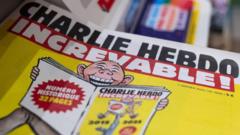In the wake of the January 7, 2015, attack on its Paris offices, Charlie Hebdo has published a special edition to commemorate the tragedy's tenth anniversary, reinforcing its dedication to satire despite ongoing threats to free expression. The attack, executed by brothers Said and Cherif Kouachi, shocked France and brought to the forefront the severe implications of militant Islamism. Following their assault, which left 12 dead, including a Muslim police officer, an atmosphere of fear set in, illustrating a ripple effect of jihadist violence that has plagued France over the past decade.
Laurent Saurisseau, known as Riss, a cartoonist who survived the attack, stated in the anniversary issue: "The desire to laugh will never disappear." This sentiment reflects the paper's enduring spirit of irreverence and optimism in the face of trauma. Charlie Hebdo's current circulation stands around 50,000 copies, produced under strict security due to ongoing threats.
The legacy of the January 2015 murders initiated a grim chapter in French history, marked by a series of terrorist attacks, including the 2015 Bataclan attacks and the 2016 Nice truck attack, resulting in the deaths of approximately 300 people linked to Islamist extremists. While the frequency of such attacks has decreased, the danger posed by radicalized individuals remains prominent.
A shift in cultural perception has occurred, with the original pretext for the murders—caricatures of the Prophet Muhammad—now considered taboo by many media outlets. Recent incidents, including the brutal murder of a schoolteacher who displayed a Charlie cartoon, exemplify this ongoing struggle with free speech and heightened sensitivity surrounding religious beliefs.
As the anniversary unfolds, some voices from the political left express concerns over Charlie Hebdo’s evolution, claiming it has overly aligned with far-right ideologies. Figures like Jean-Luc Melenchon and Green Party's Sandrine Rousseau assert that the publication has shifted its stance, casting doubt on its commitment to free expression.
Nonetheless, Riss believes that the essence of Charlie Hebdo lingers in societal consciousness, despite political criticism. He emphasizes, "It is part of our collective memory,” challenging the notion that its spirit has dissipated.
As the memory of the attack endures, the question remains: Can Charlie Hebdo's irreverent spirit and commitment to satire survive in a landscape increasingly shaped by fear and political tension?
Laurent Saurisseau, known as Riss, a cartoonist who survived the attack, stated in the anniversary issue: "The desire to laugh will never disappear." This sentiment reflects the paper's enduring spirit of irreverence and optimism in the face of trauma. Charlie Hebdo's current circulation stands around 50,000 copies, produced under strict security due to ongoing threats.
The legacy of the January 2015 murders initiated a grim chapter in French history, marked by a series of terrorist attacks, including the 2015 Bataclan attacks and the 2016 Nice truck attack, resulting in the deaths of approximately 300 people linked to Islamist extremists. While the frequency of such attacks has decreased, the danger posed by radicalized individuals remains prominent.
A shift in cultural perception has occurred, with the original pretext for the murders—caricatures of the Prophet Muhammad—now considered taboo by many media outlets. Recent incidents, including the brutal murder of a schoolteacher who displayed a Charlie cartoon, exemplify this ongoing struggle with free speech and heightened sensitivity surrounding religious beliefs.
As the anniversary unfolds, some voices from the political left express concerns over Charlie Hebdo’s evolution, claiming it has overly aligned with far-right ideologies. Figures like Jean-Luc Melenchon and Green Party's Sandrine Rousseau assert that the publication has shifted its stance, casting doubt on its commitment to free expression.
Nonetheless, Riss believes that the essence of Charlie Hebdo lingers in societal consciousness, despite political criticism. He emphasizes, "It is part of our collective memory,” challenging the notion that its spirit has dissipated.
As the memory of the attack endures, the question remains: Can Charlie Hebdo's irreverent spirit and commitment to satire survive in a landscape increasingly shaped by fear and political tension?





















